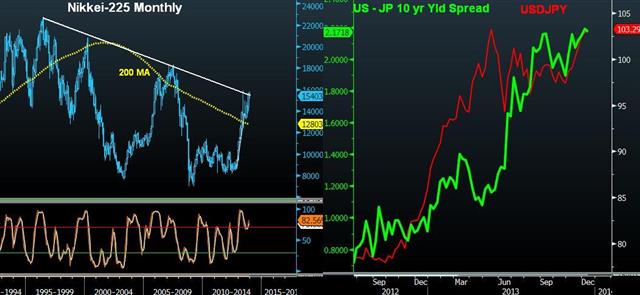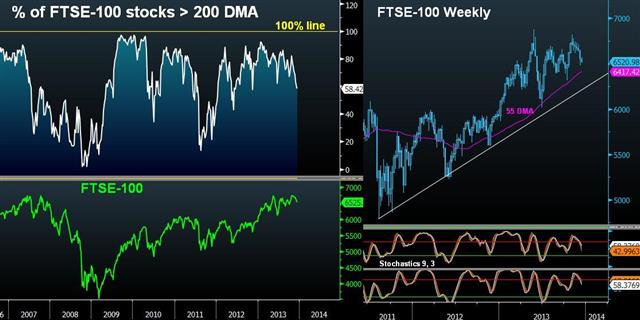Intraday Market Thoughts Archives
Displaying results for week of Dec 08, 2013Nikkei Looks on to Inflation & Wages
As yen weakness returns and the Nikkei regains its lofty gains, will the Bank of Japan succeed in turning its expansionary monetary policy into rising inflation? Full charts & analysis

Stevens Jawbones AUD, Or Did He?
Comments from RBA Governor Stevens started a cascade of Australian dollar selling but the headlines overstated his comments. The US dollar was the best performer as a broad taper trade took hold following retail sales data. The Asia-Pacific week winds down with limited data.
Traders dumped the Australian dollar as an interview with the Australian Financial Review hit the wires. The article carried a headline said 'We need a dollar close to US85¢' but the transcript of the interview was nowhere near as strong.
“I thought 85 would be closer to the mark than 95 at the time we started to make some comments some months ago, but, really, I don't think we can be that precise,” Stevens said in the only remarks on AUD.
AUD selling continued as PM Abbott piled on, telling Parliament about an $8 billion grant to the RBA that enables Stevens to 'intervene prudently'. AUD/USD slumped as low as 0.8917 from 0.9061. The Aussie had been higher on the day after the upbeat employment report. What was overlooked was a comment from Stevens saying a weaker AUD is preferable to lower interest rates, which shows reluctance to lower rates.
For the US, the major news was November retail sales and the report was upbeat. Core sales rose 0.5% compared to 0.3% and the prior report was revised 0.3 pp higher. With the House voting to pass a budget deal and the Senate expected to do the same next week, the Fed is looking at plenty of reasons to act sooner rather than later.
There was a clear move toward a taper trade Thursday with gold, stocks and bonds declining with the US dollar made broad gains. In particular, USD/JPY broke the December high and is threatening the 2013 high of 103.74. That will be a key marker in the day ahead.
In other market moves, the euro fell for the first time in 8 days but it wasn't a swift fall, barely a third of a cent. Even when all the elements are alight for euro weakness, such as today, declines are hard to come by.
Looking ahead, the lone item on the Asian schedule is the final reading on Oct Japanese industrial production. The preliminary reading was +0.5% m/m. The bigger focus will be on the Nikkei, which is likely to get some boost from yen weakness.
| Act | Exp | Prev | GMT |
|---|---|---|---|
| Core Retail Sales (m/m) | |||
| 0.4% | 0.2% | 0.5% | Dec 12 13:30 |
| Retail Sales (m/m) | |||
| 0.7% | 0.6% | 0.6% | Dec 12 13:30 |
| Industrial Production (m/m) | |||
| -1.1% | 0.3% | -0.2% | Dec 12 10:00 |
| Industrial Production (y/y) | |||
| 0.2% | 1.1% | 0.2% | Dec 12 10:00 |
| Employment Change s.a. (NOV) | |||
| 21,000 | 10,000 | -700 | Dec 12 0:30 |
| Fulltime employment (NOV) | |||
| 15,500 | -31,100 | Dec 12 0:30 | |
| Unemployment Rate s.a. (NOV) | |||
| 5.8% | 5.8% | 5.7% | Dec 12 0:30 |
| Part-time employment (NOV) | |||
| 5,500 | 28,900 | Dec 12 0:30 | |
| Employment Change (Q3) (q/q) | |||
| -0.1% | Dec 13 10:00 | ||
| Employment Change (Q3) (y/y) | |||
| -1% | Dec 13 10:00 | ||
New Zealand: An Island for Hawks
In a world of low and lower rates, New Zealand stood out Wednesday for a pledge to hike rates. Overall, it was a day for substantial risk aversion with the yen leading and Aussie lagging. Up later, AUD stays in the spotlight with jobs report.
New Zealand is among the strongest developed economies and even the strong New Zealand dollar won't keep the RBNZ from hiking rates in early 2014. Wheeler held off hiking the OCR beyond 2.50%, as expected but forecast 225 bps of hikes in the next 2.25 years. No other developed country is on that kind of path. NZD is vulnerable to risk aversion and short-term whims in the market but it's extremely well positioned for long-term gains.
A currency that has been irrepressible in the short term is the euro, which gained for the seventh consecutive day on Wednesday. EUR/USD broke 1.38 but the October high of 1.3830 looms and will make it extremely difficult to extend the streak to Day 8.
What was particularly impressive was the euro's resilience despite a 1.1% decline in the S&P 500 and large slumps in European bourses this month. That's a divergence that can't continue indefinitely, especially with the Fed decision a week away.
The taper got more good news as a budget deal from Congress appears imminent. Nothing is for sure until the votes are in but the House will decide on Thursday. Another solid development for the US are reports Stanley Fischer will be nominated as Fed deputy. His experience in emerging and small countries will be a source of wisdom for the Fed as it seeks to exit QE.
The Australian dollar snuffed out the recent rally with a tumble but the next move is likely to rely on data with the November employment report due at 0030 GMT. The consensus is for 10K jobs with the unemployment rate rising to 5.8% from 5.7%. Last month the economy added 1.1K jobs but job creation was overwhelmingly part-time, a trend that AUD bulls won't want to see continue.
| Act | Exp | Prev | GMT |
|---|---|---|---|
| Employment Change s.a. (NOV) | |||
| 1,000 | 1,100 | Dec 12 0:30 | |
| Fulltime employment (NOV) | |||
| -27,900 | Dec 12 0:30 | ||
| Part-time employment (NOV) | |||
| 28,900 | Dec 12 0:30 | ||
| Unemployment Rate s.a. (NOV) | |||
| 5.8% | 5.7% | Dec 12 0:30 | |
FTSE Beadth & Eroding December Seasonals
FTSE-100 is on track to posting its first declining December since 2002 if it ends the month below 6,650. No other global equity index has rallied in over the last 10 Decembers. We also look at the 58% participation in FTSE-100 shares below their 200 DMA. Full chart and analysis

More Than a Quiet Unwind?
It's usually the quiet days when the best trades over the past month are unwound and that was the case Tuesday as the Australian dollar led and the US dollar lagged. Other themes like weakness in bonds and gold along with stock market strength also posted corrections. Up later, we get second-tier data from Japan and US Congress is expected to announce a budget deal.
Fundamentals continue to play a secondary role in markets and curious moves are the norm. Take gold on Tuesday, it shot more than $10 higher in moments and took out the range over the past two weeks to a high of $1268.
Part of the reason is year-end. Bond are climbing because of year-end rebalancing and fund window dressing. It's hard to believe a Fed taper will have as little impact as the latest data reactions indicate. The JOLTS job openings data hit a five-year high to 3925K, beating the 3895K expected. The US inventory build that prompted a strong Q3 is also continuing in Q4 with stockpiles growing 1.4% in October compared to 0.3% expected.
The dollar gained no support on the data. Instead USD/JPY clipped below 103 and EUR/USD neared 1.38. We're reluctant to draw any conclusions about the meaning of market moves at this time of year but we're on guard against everything. A number of firms have been releasing trade ideas for 2014 and, overwhelmingly, they suggest yen shorts. Combine that with 5-year highs in yen-short bets and you have a potentially explosive mixture.
The calendar highlights in the hours ahead include Japanese machine orders at 2350 GMT (exp +0.7%) and the domestic CPGI which is poised to show some good news for inflation at 2.7% y/y.
The US threatens to steal the spotlight with multiple news agencies reporting that negotiators have reached a US budget deal to ease sequestration cuts and avoid a repeat of the government shutdown ahead of a mid-January deadline.
| Act | Exp | Prev | GMT |
|---|---|---|---|
| JOLTS - Job Openings (OCT) | |||
| 3.925M | 3.883M | Dec 10 15:00 | |
Taper Talk No Concern
The market continued to shrug off taper talk from Fed members. The pound was the top performer while the yen lagged. The calendar for Asia-Pacific trading is light.
Yen weakness was the main theme on Monday, as it has been for most of the past month. The recent correction in yen crosses has been washed away and GBP/JPY, EUR/JPY and USD/JPY all hit fresh cycle highs.
At the moment, the taper trade simply isn't a factor, as difficult as that is to believe. There was no US economic data on the day but plenty of Fedspeak.
Bullard came the closest to directly addressing QE, saying a small taper might recognize job gains and allow the Fed to monitor inflation. Fisher and Lacker argued to reduce QE, as they have for months.
The secondary battle about revealing a taper roadmap along with the first reduction in asset purchases is heating up as Bullard became the first Fed member to speak out against it. The theory is that it could limit the Fed's flexibility. Lacker, meanwhile, joined four other Fed members in endorsing a loose schedule to wind the program down.
One nod toward a taper may have come from gold as it gained $12 to $1240 but until the $1260-$1210 range breaks, it's tough to draw conclusions.
Up later, the calendar in Asia is light but there are some noteworthy events. At 2350 GMT, Japan's tertiary index is expected to rise 0.1% after a 0.2% rise in Sept. At 0030 GMT the focus shifts to Australian home loans which are forecast to rise 1.0% m/m in October. The main focus will be the Nikkei, after the 2.3% rise Monday sparked broad yen weakness.
| Act | Exp | Prev | GMT |
|---|---|---|---|
| Home Loans (OCT) | |||
| 1.0% | 4.4% | Dec 10 0:30 | |
One Eye on Bonds
The market sent mixed signals on Friday after strong US jobs growth but slowing inflation, we look at what it means. Last week, NZD and CHF led the way while the Japanese yen lagged. The week begins with Chinese trade data.
The bond market is ground zero in the taper wars and the reaction on Friday was telling. Despite excellent jobs numbers, 10-year Treasury yields finished the day 2 basis points lower at 2.85% after touching as high as 2.93%.
There are two schools of thought on:
- The economy is picking up but low inflation will prevent the Fed from tapering – a sort-of Goldilocks scenario
- The market has priced in and looked past a Dec/Jan taper, and is recognizing it won't mean a rate hike from the Fed
The answer on Friday was a resounding YES but we're skeptical and will be prepared for anything from the Fed on Dec 18 and in the days before.
The post-NFP volatility in the forex market was painful for many but we note that one trade picked a single direction and stuck to it – USD/JPY jumped and then continued higher before stalling ahead of 103.00. That's an important level but the steady reaction is even more important.
Keep an eye on Chinese trade numbers to start the week. Chinese imports are among the first things to lead or lag in the global economy as raw materials are pulled into the country and manufactured. The pace of growth has been generally steady for the past 16 months in the 5-7% y/y growth range compared to 10-20% in the earlier period. For November data the consensus is 7.0% with exports expected to rise at the same pace.
| Act | Exp | Prev | GMT |
|---|---|---|---|
| Imports (NOV) (y/y) | |||
| 5.3% | 7.2% | 7.6% | Dec 08 3:36 |
| Exports (NOV) (y/y) | |||
| 12.7% | 7.1% | 5.6% | Dec 08 3:36 |







